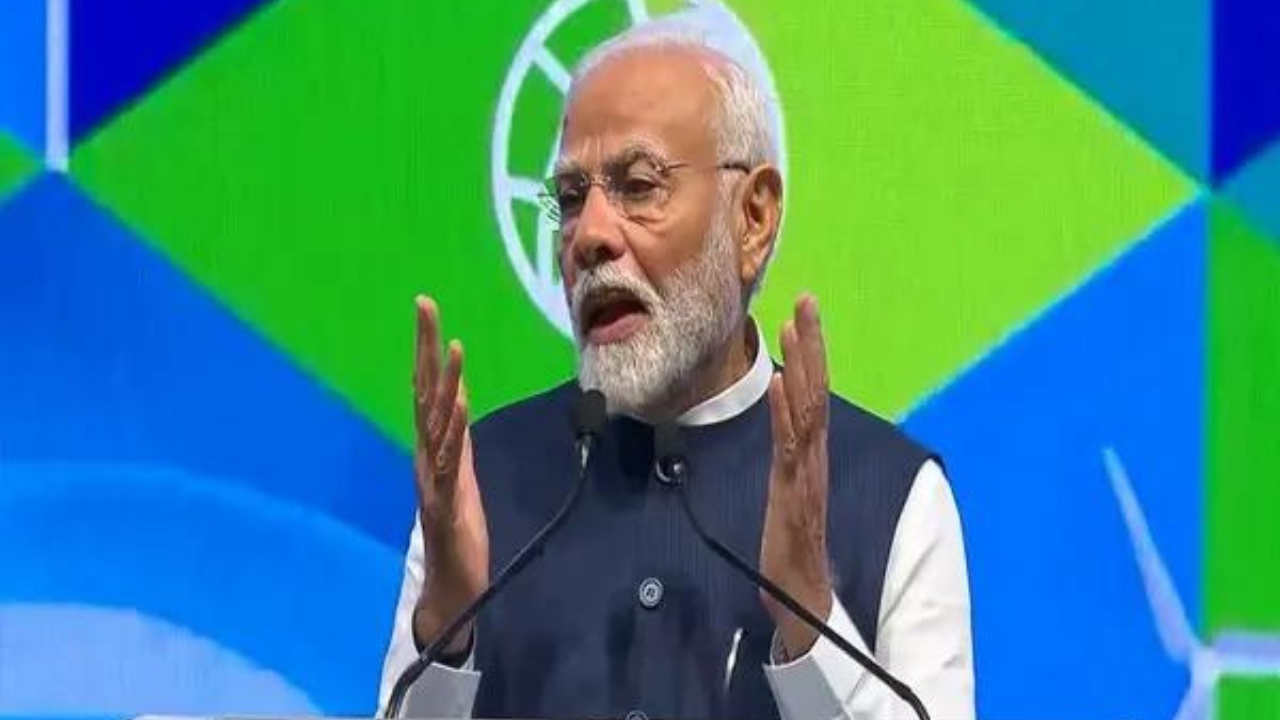NEW DELHI: India is “preparing a base for the next 1,000 years and not focusing on just reaching the top, but to sustain at that position” to make the world feel is the best bet for the 21st century, prime minister Narendra Modi said on Monday, indicating the underpinnings of the policy priorities in his third term.
“Not just India, the whole world believes that India is the best bet of the 21st century,” he told investors at the fourth renewable energy summit at Gandhinagar in Gujarat, adding the country’s diversity, scale, capacity, potential and performance are all unique and pave the way for Indian solutions for global applications.
Modi touched upon the decisions taken in the first 100 days in office — such as building 7 crore houses for the poor on top of 4 crore already distributed — to drive the point that his third term has resulted from pro-people policies aimed at supporting “140 crore citizens of India who are working with the resolve of making India the third-largest economy in the world and a developed nation by 2047″.
“Aspirations of India is the reason behind the re-election of the government for the third term,” the prime minister said, adding the 140 crore citizens, the youth and women believe that their aspirations will take new flight during the current term. “The poor, dalits and the deprived believe that the government’s third term will become a guarantee for a dignified life,” he said.
The prime minister said India has decided on a green pathway with renewables such as solar, wind, nuclear and hydro to power its ambition of becoming a developed nation by 2047.
He flagged the government’s rooftop solar scheme — ‘PM Surya Ghar Muft Bijli Yojana (PM rooftop solar scheme)’ as an example for the world to emulate, saying it will turn every household in India into a power producer.
He invoked Mahatma Gandhi to highlight the roots of India’s climate commitment. Quoting from Gandhi’s wisdom that, “Earth has enough resources to fulfil our needs, but not to satisfy our greed”, he said this vision emerged from the great tradition of India.
As a developing economy, India had a valid excuse to stay out of these commitments but did not choose that path, Modi said.”Words like ‘green future’ and ‘net zero’ are not fancy words but are the needs and commitments of the Union and every state government of India.”
“Not just India, the whole world believes that India is the best bet of the 21st century,” he told investors at the fourth renewable energy summit at Gandhinagar in Gujarat, adding the country’s diversity, scale, capacity, potential and performance are all unique and pave the way for Indian solutions for global applications.
Modi touched upon the decisions taken in the first 100 days in office — such as building 7 crore houses for the poor on top of 4 crore already distributed — to drive the point that his third term has resulted from pro-people policies aimed at supporting “140 crore citizens of India who are working with the resolve of making India the third-largest economy in the world and a developed nation by 2047″.
“Aspirations of India is the reason behind the re-election of the government for the third term,” the prime minister said, adding the 140 crore citizens, the youth and women believe that their aspirations will take new flight during the current term. “The poor, dalits and the deprived believe that the government’s third term will become a guarantee for a dignified life,” he said.
The prime minister said India has decided on a green pathway with renewables such as solar, wind, nuclear and hydro to power its ambition of becoming a developed nation by 2047.
He flagged the government’s rooftop solar scheme — ‘PM Surya Ghar Muft Bijli Yojana (PM rooftop solar scheme)’ as an example for the world to emulate, saying it will turn every household in India into a power producer.
He invoked Mahatma Gandhi to highlight the roots of India’s climate commitment. Quoting from Gandhi’s wisdom that, “Earth has enough resources to fulfil our needs, but not to satisfy our greed”, he said this vision emerged from the great tradition of India.
As a developing economy, India had a valid excuse to stay out of these commitments but did not choose that path, Modi said.”Words like ‘green future’ and ‘net zero’ are not fancy words but are the needs and commitments of the Union and every state government of India.”

